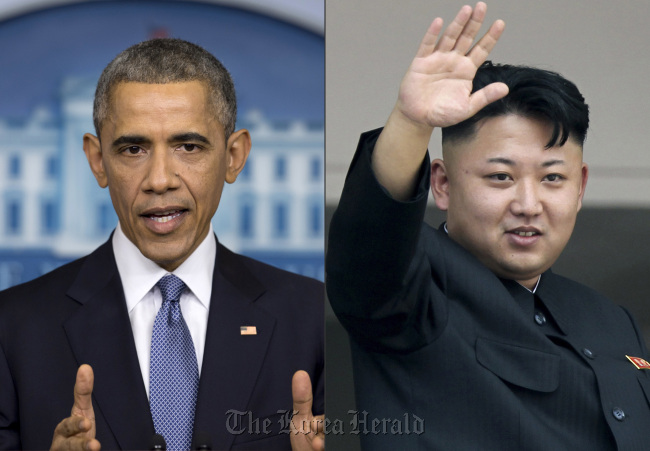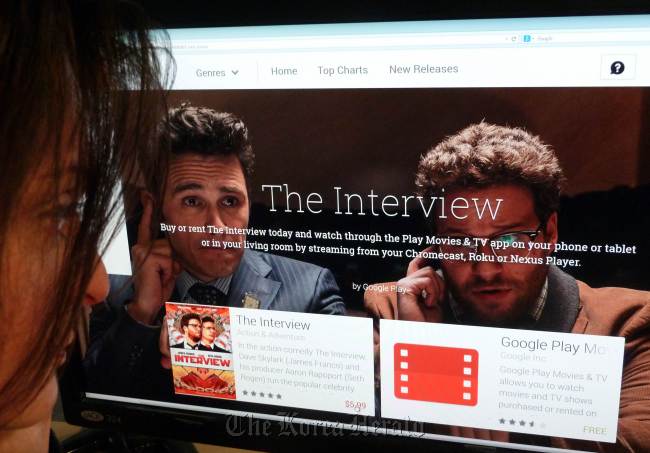With its Internet networks continuing to suffer outages for the sixth straight day, North Korea placed the blame on the U.S. and stepped up its verbal attacks over the weekend amid a hacking row involving the film “The Interview.”
As of midday, a number of propaganda websites remained down, including Uriminzokkiri (Among Our People), Ryugyong and Ryomyong. They have servers in Shenyang, Dandong and other Chinese cities.
The website of the Choson Sinbo, a pro-North newspaper based in Japan, came back online after a brief blackout early in the morning.
The sites of major news outlets including the Korean Central News Agency and the Rodong Sinmun appeared to be in operation, though they were also repeatedly shut down early last week.
China’s official Xinhua news agency reported late Saturday from Pyongyang that North Korea’s Internet and 3G telecommunication networks were “paralyzed” again and not restored at least until 9:30 p.m. The wire service reported a similar standstill last Tuesday.
Cybersecurity firm Dyn Research also tweeted later that day, “Off-again, on-again: North Korea returns after 5 hour national outage.”
As of midday, a number of propaganda websites remained down, including Uriminzokkiri (Among Our People), Ryugyong and Ryomyong. They have servers in Shenyang, Dandong and other Chinese cities.
The website of the Choson Sinbo, a pro-North newspaper based in Japan, came back online after a brief blackout early in the morning.
The sites of major news outlets including the Korean Central News Agency and the Rodong Sinmun appeared to be in operation, though they were also repeatedly shut down early last week.
China’s official Xinhua news agency reported late Saturday from Pyongyang that North Korea’s Internet and 3G telecommunication networks were “paralyzed” again and not restored at least until 9:30 p.m. The wire service reported a similar standstill last Tuesday.
Cybersecurity firm Dyn Research also tweeted later that day, “Off-again, on-again: North Korea returns after 5 hour national outage.”

The blackouts come at the height of a row over the recent hack on Sony Pictures, which Washington claimed was orchestrated by Pyongyang enraged by the studio’s planned release of “The Interview,” a film about the assassination of North Korean leader Kim Jong-un.
North Korea denies any involvement in the hacking.
Sony’s initial cancellation of the screenings sparked a an uproar, with U.S. President Barack Obama calling the decision a “mistake” and vowing “proportional” retaliation against the crippling attack.
The movie ultimately opened on Christmas Day as scheduled, albeit on a smaller scale than planned, raking in about $1 million. It is also now available online.
On Saturday, North Korea’s top governing body resorted to a racial slur, calling Obama a “monkey” and threatening “inescapable deadly blows” over the film.
“Obama always goes reckless in words and deeds like a monkey in a tropical forest,” an unnamed spokesperson of the National Defense Commission said in a statement carried by the KCNA.
“If the U.S. persists in American-style arrogant, high-handed and gangster-like arbitrary practices despite the repeated warnings of the DPRK (North Korea), the U.S. should bear in mind that its failed political affairs will face inescapable deadly blows.”
The spokesman accused the U.S. of masterminding the ongoing blackout, while arguing that the claim over the Sony hack lacks “clear evidence.”
“The U.S., a big country, started disturbing the Internet operation of major media of the DPRK, not knowing shame like children playing tag,” the official added.

Washington declined to comment on the possibility of a kind of cyberoperation. “It’s not something for us to speak to,” State Department spokeswoman Marie Harf said during a press briefing last week.
Though many observers suspect a possible U.S. role, others remain skeptical, raising the possibility of the involvement of “hactivist” groups or China, which has been increasingly vexed by its wayward ally. Most of North Korea’s strictly controlled Internet traffic passes through Chinese routers.
James Lewis, director of the strategic technologies program at the Washington-based Center for Strategic and International Studies, said in a recent media interview that the attack on North Korean websites goes beyond what Obama promised because it virtually targets the nation’s whole Internet infrastructure.
While it is difficult for Washington to move so quickly on such a matter, cyber-retaliation is not an “attractive” option as it may provoke another round of attacks, he added.
By Shin Hyon-hee (heeshin@heraldcorp.com)



![[Herald Interview] 'Amid aging population, Korea to invite more young professionals from overseas'](http://res.heraldm.com/phpwas/restmb_idxmake.php?idx=644&simg=/content/image/2024/04/24/20240424050844_0.jpg&u=20240424200058)












![[KH Explains] Korean shipbuilding stocks rally: Real growth or bubble?](http://res.heraldm.com/phpwas/restmb_idxmake.php?idx=652&simg=/content/image/2024/04/25/20240425050656_0.jpg&u=)

